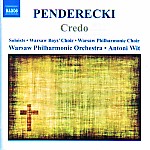Antoni Wit’s Penderecki series for Naxos has been uniformly excellent, and this latest installment is no exception. Credo, which was commissioned by Helmut Rilling and the Oregon Bach Festival, is a wholly approachable and largely optimistic work. Many of its ideas, such as the oboe solo in the first movement, are strikingly beautiful in a traditional, melodic way, and while much of the music is slowish and devotional, there is more than enough color and variety to sustain interest. The percussion writing in the eighth movement is particularly arresting, but then the work is full of characterful and always text-sensitive ideas.
As we have come to expect from this source, the singing is excellent. Penderecki’s vocal writing can be treacherous in its exploitation of extremes of high and low, and Wit invariably chooses soloists who are up to the challenge. Both of the sopranos (Iwona Hossa and Aga Mikolaj), as well as bass Remigiusz Lukomski, do a fine job with music that can sound really ungrateful. The choirs sing magnificently and the orchestra plays with total conviction. Naxos’ engineering is spacious but also detailed.
The cantata was composed in 1964 to commemorate the 600th anniversary of the founding of the Jagellonian University outside Krakow. Only six and a half minutes long, it comes from the composer’s more avant-garde period and features the usual range of evocative vocal and orchestral effects. It’s as well performed as Credo–and it makes a nice filler in that having these two pieces together offers an enjoyable view of Penderecki’s stylistic range over a roughly 30-year period. Top recommendation.
































